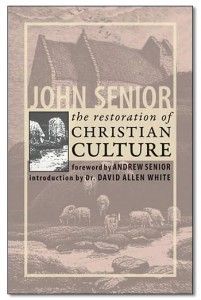From the Highlighter: John Senior II

The Restoration of Christian Culture
John Senior
More passages:
| “work, prayer, sacrifice. Those are the items on the Catholic Agenda.” p. 82. |
I'm remind of Francis Fernandez's (In Conversation with God) frequent exhortation to avoid the quest for leisure. It is a fool's errand.
Related:
| “Work is a physical necessity . . . Prayer is a duty, an office; it is a free, voluntary payment of the debt we to God for existence and grace.” p. 94-95. |
Related (and a pointed “ouch” for people like me who fall short):
| “those in the married state [should] offer a tithe of their time for prayer–about two and one-half hours per day.” p. 99. |
Even if such prayer includes time spent with religious reading and going to weekday Masses (do you, TDE reader, think it does? Please comment below), I'm only hitting the typical monetary tithing accomplishment: 2-3%. Over the past ten years or so, that observation about 2.5 hours per day has stuck with me. Scarcely a day goes by that I don't recall it.
__________
| “A poem always explains by making things less clear.” p. 113. |
I've never understood poetry, though Brooks' and Warren's Understanding Poetry helped me a lot. From what I recall from that book, I think Brooks and Warren would agree with Senior's statement.
__________
| “If you always do your best at honest work, practice steady prayer and accept the trials of daily life with a merry heart, the saints say that at the hour of death the walls of your interior mansion suddenly become like crystal and the white radiance of the presence of God shines through.” p. 114. |
Did I say this book is either quixotic or hopeful? Passages like these make me believe the book is both quixotic and hopeful.
__________
| “Movies are an index of the popular imagination.” p. 128. |
Kinda makes you want to subscribe to Entertainment Weekly.
__________
Answering Pontius:
| “Truth, St. Thomas says, is a relation of the mind and thing.” p. 165. |
__________
A helpful explanation:
| “Ism in the strict sense means an adherence to a person, cause or thing to the exclusion of everything else and to excess. Isms are results of the one-track mind and produce the fanatic.” p. 210. |
Another:
| “Religion is the species of relative justice by which we do our best to pay the incommensurable debt due to God for our existence.” p. 226. |
__________
| “there is a cause-effect relation between the work we do, the clothes we wear or do not wear, the houses we live in, the walls or lack of walls, the landscape, the semiconscious sights, sounds, smells, tastes and touches of our ordinary lives–a close connection between these and the moral and spiritual development of souls.” p. 222. |
This is not my favorite passage in the book, but it's close. It's a stunning and self-examination-provoking observation. Yet I'm amused that Senior earlier (p. 60) ridicules Marshall McLuhan's axiom that “the medium is the message.” This passage could've come directly from McLuhan's hand.
__________
Rat Own Corner:
| “a Victorian chamber pot is a work of art compared to the vulgar kitsch of a Picasso ceramic.” p. 60. |
Rat own, rat own, rat own.
| “the new Catholic Mass established in the United States has been a disaster.” p. 38. |
Rat own, rat own, rat own.
| “charity begins in prayer.” p. 93 (citing St. Catherine). |
Rat own, rat own, rat own.
| “A little learning is a dangerous thing; Drink deep, or taste not the Pierian spring.” (A line from Alexander Pope) |
Rat own, rat own, rat own.
| “In order to hear one must be still, both within and without.” p. 151. |
Rat own, rat own, rat own.
| “Justice is not a matter of desire or will, but a recognition of the way things are.” p. 183. |
Rat own, rat own, rat own.
__________
Perhaps my favorite passage from the book:
| “Silence is not just the absence of noise any more than peace is the absence of war. It is rather a positive and difficult accomplishment, a state of justice in the soul in which according to the classical formulation stretching back to Plato, each part receives its due in the performance of its proper function--the passions to give affective force in accomplishing the dictates of the will, the will to execute the commands of reason and reason to receive the truth; truth from without in abstracting essences from sense-particulars, truth from within in recognizing principles, and truth from above in obedience to grace. All that in the single word, ausculta–'hear.'” p. 152. |
I used this quote in this piece.
